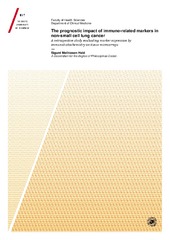| dc.description.abstract | Lung cancer is the leading cancer killer worldwide and non-small cell lung cancer (NSCLC) is the predominant subtype of lung cancer. The immune system plays an important role in cancer development. Immune-related markers expressed in the tumor microenvironment of resection specimens predict prognosis in many cancers, and may be potential targets for therapy.
We aimed to characterize the expression of selected-immune related markers in different cohorts of surgically resected NSCLC patients and relate their expression to prognosis. We constructed tissue microarrays and evaluated marker expression by immunohistochemistry.
In 55 patients treated with postoperative radiotherapy, increased expression of the T-cell markers CD4 and CD8 indicated was associated with a markedly improved disease-spesific survival.
We investigated the expression of the chemokines CXCR6 and CXCL16 in 335 NSCLC patients, and showed that lower CXCL16 expression by cells in the tumor stroma and in cancer cells was associated with worse disease-specific survival. In cell-based assays, we found that silencing CXCL16 expression in lung cancer cells increased proliferation.
We have previously identified stromal CD8 expression as a promising prognostic marker in NSCLC. Using a training cohort (n = 155) and three validation cohorts (n = 169, n = 295, n = 178), we found that increased stromal CD8 expression was consistently associated with improved survival. When the cohorts where combined, stromal CD8 was significantly associated with disease-specific and overall survival for all pathological stages, and may therefore be a good candidate marker for an NSCLC immunoscore.
Lastly, we investigated the expression of the immune checkpoint LAG-3 in both primary NSCLC tumors (n = 553) and their metastatic lymph nodes (n = 143). We found that increased expression of LAG-3 on tumor-infiltrating lymphocytes in both primary tumors and metastatic lymph nodes was associated with improved disease-specific survival.
Based on our present findings, we believe that evaluating immune-related markers can have an important prognostic utility in NSCLC. Validation of these findings in adequately powered prospective trials will be crucial for their potential clinical implementation. | en_US |
| dc.description.popularabstract | Lung cancer is the leading cause of cancer-deaths worldwide. The immune system can both promote and inhibit lung cancer development, but much in unknown regarding the expression of different immune cells in lung cancer tissues and their influence on prognosis. We have investigated the expression of multiple immune cells and immune-related molecules in patients treated with surgery for non-small cell lung cancer, which is the most common form of lung cancer. We found that increased expression of specific immune cells and related molecules, such as CD8 and LAG-3, in non-small cell lung cancer tissues is associated with longer patient survival. Ultimately, if confirmed in larger trials, our research may allow us to more accurately predict prognosis for lung cancer patients and aid doctors in selecting appropriate treatments. | en_US |
| dc.description | The papers 3 and 4 of this thesis are not available in Munin. <br>
<br>
Paper 3: Donnem, T., Hald, S. M., Paulsen, E., Richadsen, E., Al-Saad, S., Kilvaer, T., Brustugun, T., Helland, A., Lund-Iversen, M., Poehl, M., Olsen, K. E., Al-Saad, K., Kiselev, Y., Sandanger, T., Andersen, S., Pezzella, F., Busund, L. T., Bremnes, R. M.: “Stromal CD8+ T-cell Density-A Promising Supplement to TNM Staging in Non-Small Cell Lung Cancer”. Available in <a href=http://dx.doi.org/10.1158/1078-0432.CCR-14-1905> Clinical Cancer Research 2015, 21(11):2635-43. </a>
<p>
Paper 4: Hald, S. M., Khanehkenari, M. R., Martinez, I., Richardsen, E., Al-Saad, S., Kilvaer, T. K., Paulsen, E. E., Andersen, S., Blix, E., Busund, L. T., Bremnes, R. M., Donnem, T.: “LAG-3 in non-small cell lung cancer: expression in primary tumors and metastatic lymph nodes is associated with improved survival”. (Manuscript). | en_US |


 English
English norsk
norsk


